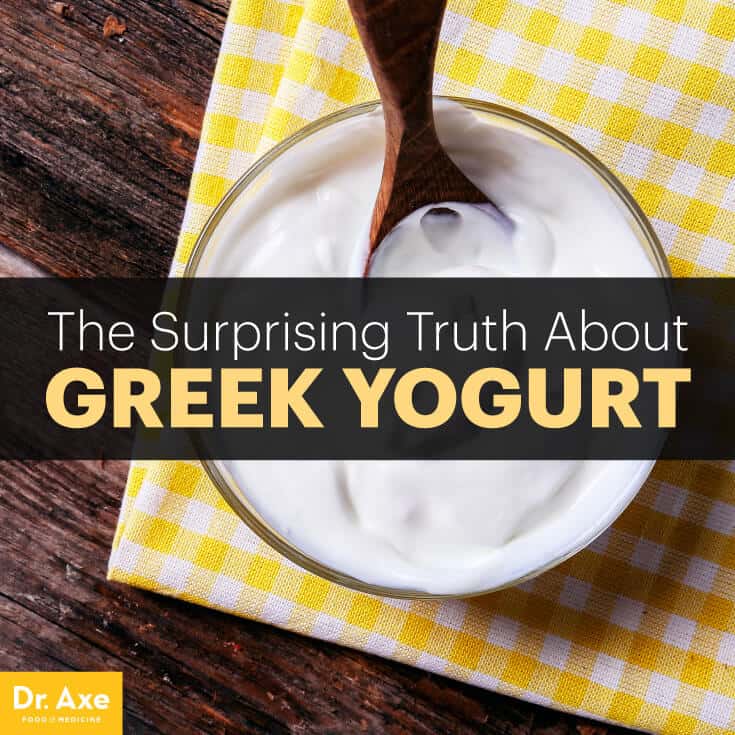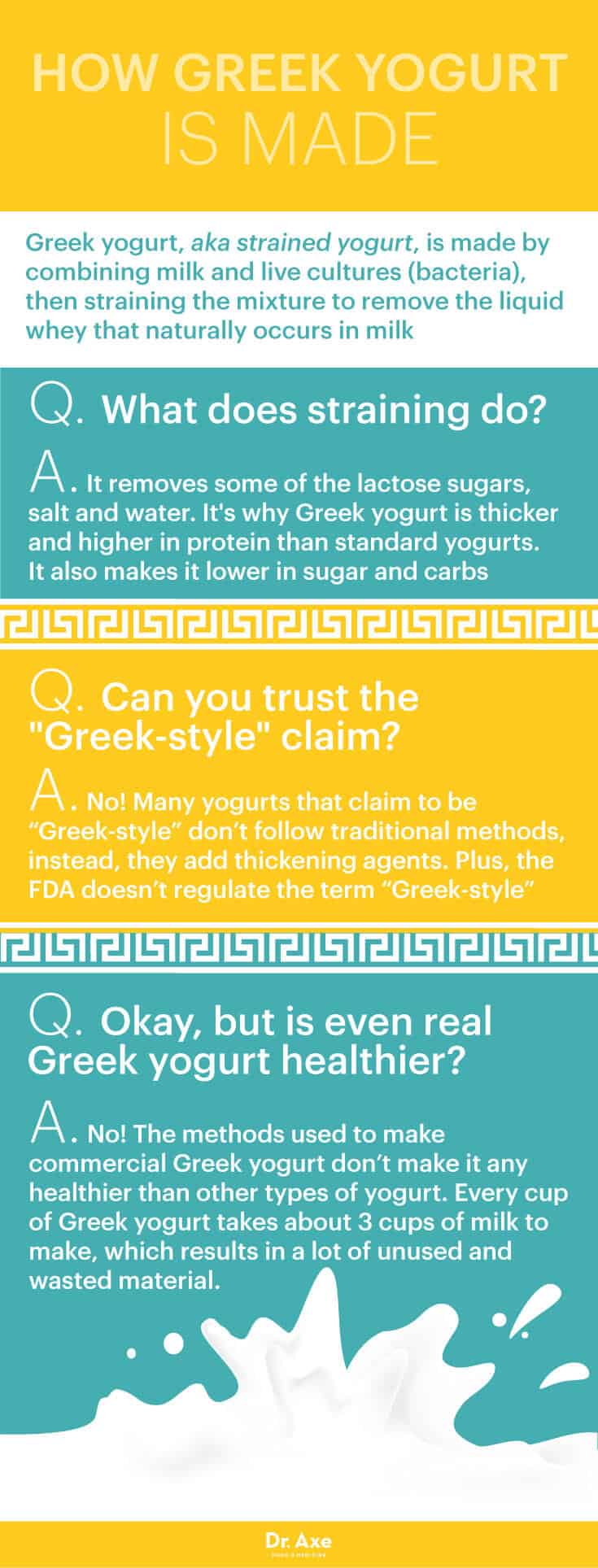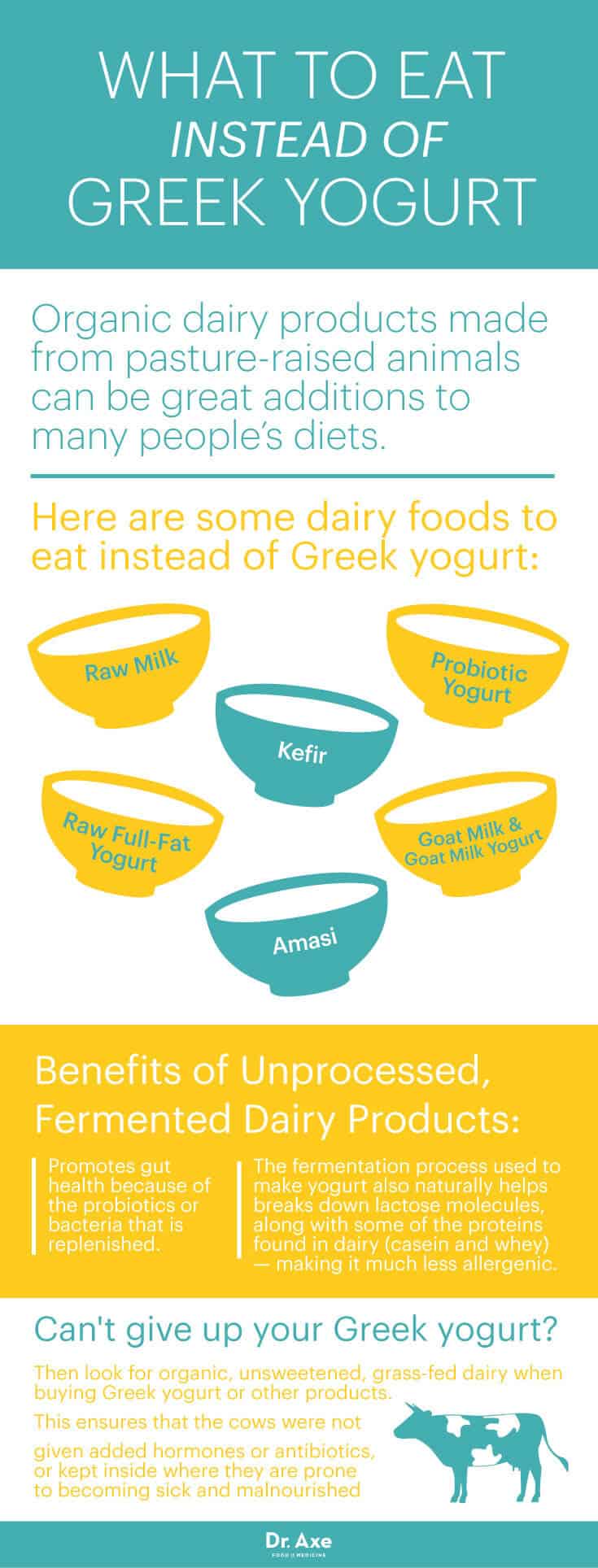Greek Yogurt Nutrition: Good or Bad?

There are many under-appreciated foods that can literally turn around our health. Sauerkraut and kimchi come to mind. Equally, there are over-appreciated, overhyped foods that most people believe are good for them. For example, the virtues of whole grains are continually publicized even though many people would be healthier without them.
Where does Greek yogurt fall?
Around the world, dairy is mostly recognized as an important part of a healthy, well-balanced diet. And yogurt is usually the most acclaimed dairy product of all — especially Greek yogurt, which has become more popular than ever over the past decade or so. That’s because of its thick, creamy texture plus being known to provide hard-to-get calcium in addition to high amounts of protein and several other nutrients, like B vitamins.
On the other hand, dairy products, including Greek yogurt, aren’t always all they’re cracked up to be. In general, dairy can be confusing because dairy products are naturally high in saturated fat, which is typically portrayed as harmful and tied to high cholesterol levels. In fact, trusted organizations like the American Heart Association have recommend people eat mostly nonfat or low-fat dairy products, including yogurt, for decades.
Think your greek yogurt is healthy? Download this guide for why it may not be.
In addition, more people are concerned with added hormones, sugar, artificial additives, colors or sweeteners that are used to make most store-bought yogurts. Yet others, including those who read my articles, have heard all about the gut-friendly benefits of probiotic yogurt.
So what’s the verdict when all is said and done — is Greek yogurt healthy or not?
Background of Greek Yogurt
Here’s a bit about how Greek yogurt is made, plus a brief history of where it comes from:
Greek yogurt originated in parts of Europe hundreds of years ago, where widely available cow and goat milk were first fermented to prolong shelf life. Greek yogurt is made by combining milk and live cultures (bacteria), then straining the mixture through a filter to remove the liquid whey that naturally occurs in milk. (1) Whey is normally left over when milk curdles. Straining also removes some of the lactose sugars, salt and water, which is why Greek yogurt is thicker and higher in protein than standard yogurts, but also usually lower in sugar and carbohydrates.
Today, many yogurts that claim to be “Greek-style” don’t follow traditional methods and instead take shortcuts, like adding thickening agents such as condensed milk, corn starch, carrageenan or gelatin. In fact, the FDA doesn’t regulate the term “Greek-style,” so this actually means practically nothing when it comes to ingredients or preparation. (2)
The methods used to make commercial Greek yogurt don’t make it any healthier than other types of yogurt — in fact, the $2 billion Greek yogurt industry is now tied to environmental concerns related to disposing high amounts of leftover byproducts called whey acids.
Here’s a little-known Greek yogurt nutrition fact: Every cup of Greek yogurt takes about three cups of milk to make, which results in a lot of unused and wasted material that needs to be disposed of (as a comparison, in looking at Greek yogurt vs. regular yogurt nutrition, regular yogurt uses about a quarter of this amount). (3)
Depending on your tolerability, dairy products in general are potentially problematic foods. A popular Greek yogurt myth is that, basically, it’s healthy. But most people today are beginning to understand that dairy products, including yogurt, fall in the questionable category since they can be hard to digest for many people — on top of most brands being loaded with junk.
Humans are the only species that continues to drink milk after infancy and the only species that drinks another mammal’s milk. But the problem with Greek yogurt nutrition goes beyond these points — it also has to do with the little-known fact that preparation and manufacturing processes, including pasteurization, can destroy a high level of the nutrients that dairy has to offer in the first place.
Why Greek Yogurt ISN’T as Healthy as You Thought
Despite what most people think, here are several things you need to know about Greek yogurt nutrition, showing that it isn’t quite as beneficial as you’ve been led to believe:
1. Risk for Lactose Intolerance
The ability to digest dairy is more complicated than you might think. Some people can tolerate dairy products well, while others have strong reactions to lactose, casein or other compounds found in dairy that cause them to experience symptoms like acne, diarrhea, bloating and gas. The bulk of dairy’s health problems come from its natural sugars (lactose) and proteins (whey or casein). Both can be seriously inflammatory, especially when natural enzymes are removed from milk that help with the digestion process.
The lactose in yogurt can cause discomfort for some people who lose the ability to digest lactose after infancy. This results in symptoms of lactose intolerance caused by a reaction to lactose, which is a type of sugar. (4) Like certain other carbohydrates (such as FODMAPs), when it’s not properly digested, it can lead to digestive discomfort, bloating, overgrowth of bad bacteria and digestive issues like SIBO.
2. Hormonal Trouble
Conventional dairy farms often use added growth hormones to boost the cows’ production of milk. Even without added hormones, dairy naturally contains some hormones, which can be problematic for people prone to hormonal imbalances. This makes sense if you think about it, since milk comes out of cows’ mammary glands where progesterone, estrogen, testosterone and other hormones are present.
While some people can benefit greatly from high-quality dairy, it’s worth some experimentation if you fall into a hormone-sensitive category and experience acne, PMS symptoms, irregular periods, etc. Some people, especially women with hormonal irregularities, find that they have better hormonal stability, clearer skin, lighter periods, easier weight loss and better digestion when avoiding all dairy — including Greek yogurt.
3. Potential for Acne and Skin Flare-Ups
Lactose intolerance isn’t always the cause for digestive issues from yogurt or milk. Pasteurized and homogenized milk used to make Greek yogurt can cause histamine reactions and gut problems in some people.
Casein, the other dominant dairy protein other than whey, is capable of triggering an immune response in the form of a histamine reaction, which leads to inflammation, swelling and other signs of allergies. Studies have found that histamine intolerance includes reactions to food allergies like dairy and can cause acne, eczema, hives, rashes, and even asthma or sinus problems. (5, 6)
4. Other Autoimmune Reactions
For people with sensitive digestive systems, lactose, whey or casein can affect the gut in the same way that food allergens like gluten do. Anyone who has existing damage within the gut environment, including leaky gut syndrome or autoimmune conditions, is especially vulnerable to negative dairy reactions. That’s because once the immune system is triggered by any allergy or sensitivity, it begins to attack the body’s own tissue and raise inflammation levels, making it more likely to see dairy as a threat.
If you have a known intolerance or allergy to gluten (celiac disease), or an autoimmune disorder like Hoshimoto’s disease or arthritis, you could benefit from eliminating dairy and seeing if you notice a decrease in symptoms — like fatigue, brain fog, bloating, aches and pains.
5. Potential for Weight Gain
Most Greek yogurts that are promoted as “healthy” are unnaturally low-fat and have added sugar to make up for the lack of taste. Even though mainstream nutrition recommendations promote low-fat dairy as being healthier than full-fat, removing natural fat from dairy means that other additives need to be used in order to give yogurt an attractive texture and taste — so it usually contains cane sugar, high fructose corn syrup, or artificial sweeteners and ingredients.
Greek yogurt has an especially “tart” taste, so usually it takes even more sugar to appease customers. Dairy already contains sugar naturally, so adding even more means it will cause a bigger insulin response and raise the risk for blood sugar fluctuations, potentially leading to weight gain or even diabetes. (7)
What to Have Instead of Greek Yogurt
Dairy isn’t all bad like it might seem — in fact, I believe that raw milk is beneficial along with other organic dairy products made from pasture-raised animals (cows, goats or sheep); they can be great additions to many people’s diets.
This is especially true for probiotic yogurt, which is fermented and has been a time-honored food for thousands of years, providing probiotics in addition to valuable nutrients that are often low in people’s diets today. The difference between most Greek yogurts and the type I recommend has to do with the quality of the milk and process used to make the yogurt.
Unprocessed, fermented dairy products are beneficial for gut health because of the probiotics (“good bacteria”) they provide, assuming dairy proteins are not an issue for you. The live cultures active in Greek yogurt usually include bacteria S. thermophilus (St) and L. bulgaricus (Lb), which are responsible for its characteristic sour or tangy taste.
Yogurt and kefir are two popular fermented dairy products, which means they hold protective bacteria that’s available to you when you eat them. Amasi is another beneficial fermented milk beverage available in some specialty stores that has the consistency of a liquid yogurt.
In addition to providing bacteria that can help replenish and promote gut health, the fermentation process that is used to make yogurt also naturally helps breaks down lactose molecules, along with some of the proteins found in dairy (casein and whey). This usually means they are easier on digestion than milk, plus they have less of a hormonal response. Another option is to consider drinking goat milk and buying goat milk yogurt, which tends to cause less digestive discomfort in many people than cows’ milk.
Along with choosing fermented types of dairy over unfermented dairy, you want to ideally find raw and full-fat yogurt. Fat is a natural part of milk, and it’s the fat that is actually a rich source of vitamins A and D. Full-fat dairy from grass-fed cows also provides higher levels of two rare nutrients, conjugated linoleic acid and vitamin K2. Conjugated linoleic acid is known to improve immune function and help with weight maintenance and insulin control. K2 is necessary for many different bodily functions, including building strong bones, teeth and healthy skin.
Why is raw yogurt and milk best? Here’s what you need to know if you’re not familiar with raw dairy products: Pasteurization and homogenization can denature dairy and alter its natural chemical structure, making fats rancid and difficult to digest, while also destroying nutrients and important enzymes. Pasteurization is the process of heating milk to very high temperatures in order to destroy all disease-causing bacteria and pathogens, but in the process it unfortunately also lowers many nutritional qualities and leads sugar and protein molecules to change form, which makes them more likely to trigger immune reactions.
There’s a big difference between pasteurized milk and raw milk for this reason, so even people who cannot tolerate congenital yogurt or milk well might find they can digest raw milk.
Finally, another important factor to consider is the health of the animal that produces the dairy. The quality of an animal’s diet and its living conditions have significant effects on the nutritional value of its meat or milk. Dairy products from industrially raised cows have a low nutritional value, since the cows are often fed an unnatural diet and kept indoors for the majority of their lives.
Most Greek yogurt that is available in supermarkets comes from cows raised on corn, soy and scrap feed that live in closely packed, industrial dairy-processing plants, where they are never allowed to roam freely on grass.
What’s a better alternative to conventional yogurt? Products from grass-fed cows that were raised in a pasture are known to contain a higher percentage of nutrients, including healthy fats like omega-3s. Healthy cows have a healthier gut environment and obtain more antioxidants in their diets from grass, which means they store and provide more vitamins (like vitamin A and E, for example) within their milk.
Look for organic, unsweetened, grass-fed dairy when buying Greek yogurt or other products. This ensures that the cows were not given added hormones or antibiotics, or kept inside where they are prone to becoming sick and malnourished.
If you’re set on eating Greek yogurt for its higher protein content, look at the main ingredients — you want to see milk and live active cultures, but not added protein like “whey concentrates” or thickeners like “modified corn starch.”


No comments:
Post a Comment